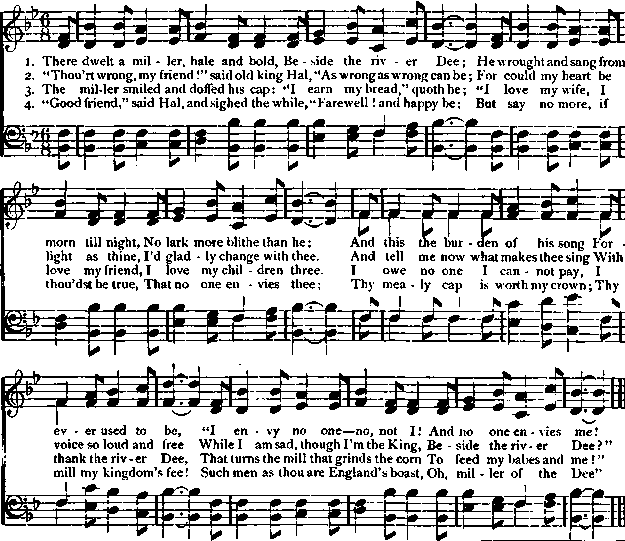Franklin Square Song Collection - online songbook
200 favorite songs and Hymns for Schools, Homes Lyrics & Sheet Music
| Share page | Visit Us On FB |
|
22 |
FRANKLIN-SQUARE SONG COLLECTION. |
||||
|
To Religion, music owes indeed a threefold homage. First, the earliest authentic records which we have in the history of music, as it now is, are records in the history of church music; so that music, as an art, began in the church. Second, the greatest workers in the realm of music, and a large majority of all the workers in that realm, have been earnest Christian men, influenced, and to a great extent controlled, by a strong religious zeal. Third, the subjects which have inspired the masterpieces of the classics, are themes taken from the Christian's guide-book, the Bible. Although the ancient Egyptians, Greeks and Romans had both vocal and instrumental music, yet, as Mr. Hunt says in his concise History of Music, " It is not until the fourth century after Christ, that the actual history of music as a separate art begins." Not only did it have its be- |
ginning in the Christian era, but it received its first tangible and permanent mold from zealous Christian men. They not only, as Choran says, "transmitted to us all the ancient practical music, with which we are acquainted," but they built upon this the foundation upon which the present superstructure stands. How long might music have languished and remained rude and uncultivated if there had not arisen such zealous Christian workers as Pope Sylvester, St. Ambrose, St. Gregory and Guido Aretina! The greatest composers of music, and those who have done most for the art, have been men of deep religious feeling, earnestly laboring to render their best service to a God whom they not only loved, but whom they believed to demand of them ten more talents for the talents he had lent. Under the influence of religious zeal a man will accom- |
||||
|
THE MILLER OF THE DEE. |
Chas. Mackay. |
||||
|
|
|||||
 |
|||||
|
|
|||||
|
plish more than under any other impulse. Can we think of the author of "The Messiah" as any other than a religious man ? Moore says, in his Encyclopedia, " Haydn was very religious; it may even be said that, through his firm faith in the truths of religion, his talent was increased." The commencement of all his scores was inscribed with some of the following mottoes: " In Nomine Domini," (In the name of the Lord) or " Soli Deo Gloria," (To God alone be glory) and, at the end of all of them, "Laus Deo." (Paiseto God). He himself said : " When I was working on ' The Creation,' I felt myself so penetrated with religion, that, before I sat down to my piano, I prayed confidently to God to give me the talent requisite to praise him worthily." Of Mendelssohn, Lampadius says : '• To speak out in a |
single word what was the most salient feature of his character, he was a Christian in the fullest sense." But, after all, the subject which the composer chooses, the theme, is often a fountain of inspiration. How-could Haydn have written so grandly if he had not for a subject " The Creation ?" What characters for grandeur are Elijah and St. Paul? What could have inspired Handel like " The Messiah," or upon what other theme could he have heard angelic hosts shouting " Hallelujah, hallelujah!" We need but mention such subjectsasthe Masses (for example, Beethoven's Mass in D),and the grandest and most sublime of all music, Bach's "Passion Music," "which will endure unto the end of time," to show what great, almost heavenly power, is drawn forth by religious subjects.—More. |
||||